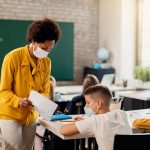Two innovative art projects funded by the Neag School’s Rogers Educational Innovation Fund, including a photojournalism art exhibit in Norwalk, Connecticut, and a mural project at a middle school in Hartford, Connecticut, brought together middle school students this past spring. The fund is in place thanks to the support of the late Neag School of Education Professor Emeritus Vincent Rogers and his late wife, Chris, a lifelong teacher. While Professor Rogers wasn’t able to personally enjoy the fruits of the projects his fund supported due to his passing in December 2020, the projects lived on at a middle school and an art gallery.
Even before COVID-19, as many as 1 in 6 young children had a diagnosed mental, behavioral or developmental disorder. New findings suggest a doubling of rates of disorders such as anxiety and depression among children and adolescents during the pandemic. One reason is that children’s well-being is tightly connected to family and community conditions such as stress and financial worries.
In her work in schools in Central Florida, Dr. Rebecca Campbell-Montalvo, postdoctoral research associate in the University of Connecticut Neag School of Education, found that parents can be hesitant to disclose the languages their children speak for a variety of reasons. She explains that by “making a welcoming school climate and atmosphere and culture that people can perceive,” parents will be encouraged to report home languages. Creating a welcoming atmosphere could involve displaying signs, sending families information in multiple languages, and providing translators at school events.
“Even before COVID-19, as many as 1 in 6 young children had a diagnosed mental, behavioral or developmental disorder. New findings suggest a doubling of rates of disorders such as anxiety and depression among children and adolescents during the pandemic. One reason is that children’s well-being is tightly connected to family and community conditions such as stress and financial worries,” co-writes Sandra Chafouleas, a Board of Trustees Distinguished Professor in the Neag School of Education.
Special education teachers are at heightened risk for stress and burnout, which negatively impacts their effectiveness and well-being. With a new five-year, $4 million grant from the Institute of Educational Sciences, Penn State and Georgia State University (GSU) researchers are teaming up with school districts in Georgia to develop and test an adaptation of the Cultivating Awareness and Resilience in Education (CARE) professional development program to support special education teachers. Tamika La Salle, associate professor of school psychology at the University of Connecticut, will advise the team on culturally responsive education practices.
This summer, the Center for Education Policy Analysis, Research, and Evaluation (CEPARE) at UConn’s Neag School of Education convened more than 50 principals, assistant principals, educators, and school district leaders from across the state of Connecticut to coach them on fostering social, emotional, and behavioral well-being and safe school environments.
Imagine a group of students not quite out of high school dedicating a considerable chunk of summer break to such activities as interpreting data, carrying out diagnostic coding, and reviewing academic literature — and loving every minute of it.
Thanks to the Young Scholars Senior Summit (YSSS), a three-week program hosted by UConn since 2018 and funded by the Jack Kent Cooke Foundation, this was the reality for select rising seniors from across the country this past July.
“There is no one who is more important and sustained than Senator Christopher J. Dodd,” said Glenn Mitoma, the director of Dodd Human Rights Impact. Mitoma added he had the honor of working with Dodd “over the past 8 years as we crafted these new programs, as we envisioned the kind of impact that we wanted to have, and as we worked to develop the resources in order to support these initiatives.”
The Wellness Coalition’s Academic Affairs Partnership Committee understands that student well-being is the key to student success. In this video, the committee highlights important health and wellness resources for students and invites you to share your ideas for improving student well-being at UConn in the 2021-2022 academic year.
“As a professor and researcher in special education, I’ve worked with many students with disabilities transitioning to college. The ones who are typically most successful after high school are the ones who were prepared to be strong self-advocates, who could seek out needed services and supports, and who could manage the multiple demands of being independent,” writes Joseph Madaus, a professor of educational psychology at UConn’s Neag School of Education and director of the Collaborative on Postsecondary Education and Disability.




